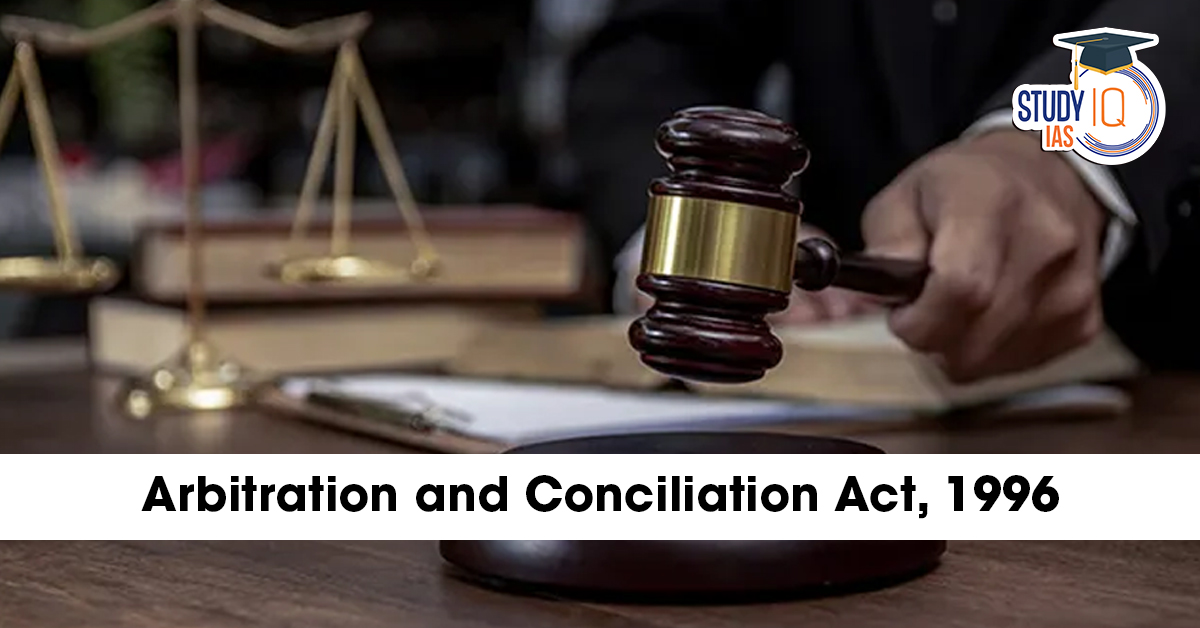Table of Contents
The Arbitration and Conciliation Act, 1996 is the cornerstone of alternative dispute resolution (ADR) in India.
Enacted to align Indian law with international arbitration standards, it is based on the UNCITRAL Model Law (1985) and the UNCITRAL Conciliation Rules (1980).
The Act aims to promote faster, fair, and cost-effective dispute resolution by minimizing judicial intervention and encouraging parties to settle disputes outside traditional courts.
Objectives of the Arbitration and Conciliation Act, 1996
-
To streamline arbitration and conciliation procedures in India.
-
To ensure independence and impartiality in arbitral proceedings.
-
To reduce delays and backlog in the judicial system.
-
To recognize and enforce foreign arbitral awards in India.
-
To make India an international arbitration hub.
Structure of the Act
The Arbitration and Conciliation Act, 1996 is divided into four major parts:
| Part | Subject Matter | Key Sections |
|---|---|---|
| Part I | Domestic Arbitration and International Commercial Arbitration | Sections 2–43 |
| Part II | Enforcement of Certain Foreign Awards (New York & Geneva Conventions) | Sections 44–60 |
| Part III | Conciliation (non-binding mediation-style settlement) | Sections 61–81 |
| Part IV | Supplementary Provisions (rules, notifications, repeal) | Sections 82–86 |
Key Features and Provisions
1. Arbitration Agreement (Section 7)
A written arbitration clause or agreement between parties to submit disputes to arbitration rather than litigation.
2. Composition of the Arbitral Tribunal (Sections 10–15)
-
Parties are free to decide the number of arbitrators (must be odd).
-
Appointment and removal procedures ensure neutrality and transparency.
3. Jurisdiction of Arbitral Tribunal (Section 16)
The tribunal can rule on its own jurisdiction—a principle known as kompetenz-kompetenz.
4. Conduct of Arbitral Proceedings (Sections 18–27)
-
Parties must be treated equally and fairly.
-
The tribunal determines procedures, evidence, and hearings.
-
Proceedings are confidential and flexible.
5. Arbitral Award (Section 31)
-
Final decision by the arbitrator(s).
-
Must be written, reasoned, dated, and signed.
-
Enforceable as a court decree under Section 36.
6. Setting Aside an Award (Section 34)
An arbitral award can be challenged only on limited grounds:
-
Invalid arbitration agreement.
-
Lack of due process.
-
Conflict with public policy of India.
-
Patent illegality on the face of the award.
-
Unreasonable delay that affects fairness (as per SC 2025 ruling).
7. Enforcement of Foreign Awards (Part II)
Awards made under the New York Convention (1958) and Geneva Convention (1927) can be recognized and enforced in India.
8. Conciliation (Part III)
A voluntary, non-adversarial process where a neutral conciliator helps parties reach an amicable settlement, which once signed, has the status of an arbitral award.
Key Amendments to the Arbitration and Conciliation Act
| Year | Key Highlights |
|---|---|
| 2015 Amendment | Introduced time limits (12 months for completion), curtailed court interference, and recognized interim relief by arbitral tribunals. |
| 2019 Amendment | Established Arbitration Council of India (ACI) to regulate institutions, accredit arbitrators, and promote institutional arbitration. |
| 2021 Amendment | Allowed automatic stay on awards obtained through fraud or corruption, strengthening integrity and transparency. |
Recent Supreme Court Interpretation (2025 Update)
In November 2025, the Supreme Court of India held that:
“An arbitral award may be set aside if an undue and unexplained delay in its delivery adversely impacts the quality, reasoning, or fairness of the decision.”
This judgment reaffirmed that efficiency and timeliness are integral to public policy under Section 34(2)(b)(ii), and prolonged delay can render an award patently illegal.
Arbitration Council of India (ACI)
Formed under the 2019 Amendment, ACI is a statutory body to:
-
Grade and accredit arbitration institutions.
-
Maintain a panel of qualified arbitrators.
-
Promote institutional arbitration.
-
Set professional and ethical standards for arbitrators.
This move aims to make India a preferred global arbitration destination, on par with Singapore, London, and Paris.
Importance of the Act
-
Promotes Ease of Doing Business: Provides a reliable and quick dispute resolution mechanism.
-
Reduces Court Burden: Encourages settlement outside the judiciary.
-
Boosts Investor Confidence: Strengthens India’s global investment climate.
-
Ensures Finality and Enforceability: Awards are binding and executable like court decrees.
-
Encourages Institutional Arbitration: Supports the growth of arbitration centres and trained professionals.
Challenges in Implementation
-
Delays in enforcement despite award finality.
-
Shortage of experienced arbitrators.
-
Limited awareness about arbitration among small businesses.
-
Need for stronger institutional arbitration frameworks and digital dispute resolution.
Conclusion
The Arbitration and Conciliation Act, 1996 has transformed India’s dispute resolution landscape by emphasizing speed, neutrality, and global compatibility.
Continuous amendments, judicial clarity, and institutional reforms are helping India move toward becoming an international arbitration hub.
As recent Supreme Court rulings show, justice delayed is justice denied—and ensuring timely, reasoned arbitral awards remains central to the credibility of the arbitration system.


 International Day of Women and Girls in ...
International Day of Women and Girls in ...
 Particle Therapy Breakthrough: Future of...
Particle Therapy Breakthrough: Future of...
 India’s Space Missions 2026: Chandraya...
India’s Space Missions 2026: Chandraya...

























